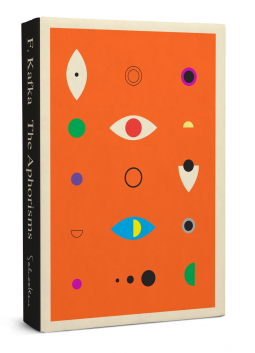
Aphorisms
by Franz Kafka
This title was previously available on NetGalley and is now archived.
Buy on Amazon
Buy on BN.com
Buy on Bookshop.org
*This page contains affiliate links, so we may earn a small commission when you make a purchase through links on our site at no additional cost to you.
Send NetGalley books directly to your Kindle or Kindle app
1
To read on a Kindle or Kindle app, please add kindle@netgalley.com as an approved email address to receive files in your Amazon account. Click here for step-by-step instructions.
2
Also find your Kindle email address within your Amazon account, and enter it here.
Pub Date Nov 17 2015 | Archive Date Nov 03 2015
Knopf Doubleday Publishing Group | Schocken
Description
Kafka’s aphorisms are fascinating glimpses into the lure and the enigma of the form itself. • From the acclaimed author of The Metamorphosis and The Trial—and one of the most acclaimed writers of the twentieth century.
The aphorism eludes definition: it can appear to be a random jotting or a more polished observation. Whether arbitrary fragment or crystalline shard, an aphorism captures the inception of a thought. Franz Kafka composed aphorisms during two periods in his life. A series of 109 was written between September 1917 and April 1918, in Zürau, West Bohemia, while Kafka was on a visit to his sister Ottla, hoping for a brief respite following the diagnosis of the tuberculosis virus that would eventually claim his life.
They were originally published in 1931, seven years after his death by his friend and literary executor Max Brod, under the title Betrachtungen über Sünde, Hoffnung, Leid, und den wahren Wag (Reflections on Sin, Hope, Suffering, and the True Way). The second sequence of aphorisms, numbering 41, originally appeared as entries in Kafka’s diary from January 6 to February 29, 1920. They, too, were published posthumously, under the title “Er”: Aufzeichnungen aus dem Jahr 1920 (“He”: Reflections from the Year 1920).
The aphorism eludes definition: it can appear to be a random jotting or a more polished observation. Whether arbitrary fragment or crystalline shard, an aphorism captures the inception of a thought. Franz Kafka composed aphorisms during two periods in his life. A series of 109 was written between September 1917 and April 1918, in Zürau, West Bohemia, while Kafka was on a visit to his sister Ottla, hoping for a brief respite following the diagnosis of the tuberculosis virus that would eventually claim his life.
They were originally published in 1931, seven years after his death by his friend and literary executor Max Brod, under the title Betrachtungen über Sünde, Hoffnung, Leid, und den wahren Wag (Reflections on Sin, Hope, Suffering, and the True Way). The second sequence of aphorisms, numbering 41, originally appeared as entries in Kafka’s diary from January 6 to February 29, 1920. They, too, were published posthumously, under the title “Er”: Aufzeichnungen aus dem Jahr 1920 (“He”: Reflections from the Year 1920).
Available Editions
| EDITION | Ebook |
| ISBN | 9780805243369 |
| PRICE | $14.99 (USD) |



